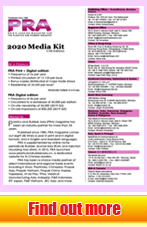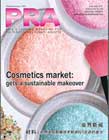PRA Chinese
Rubber Journal Asia Injection Moulding Asia Energy, Oil & Gas Asia
VISIT OUR OTHER SITES:
PRA Chinese
Rubber Journal Asia
Injection Moulding Asia
Energy, Oil & Gas Asia
Compostable plastics breakdown in 22 days, says study
A recent study by Wageningen University & Research (WUR), Netherlands, analysed the fate of compostable packaging products in a full-scale industrial organic waste treatment facility. The results show that the tested EN13432 certified products break down within a maximum of 22 days. The project was commissioned by the Dutch Ministry of Economic Affairs and Climate Policy (EZK). “The study shows that the tested objects have the same disintegration and degradation rate as regular biowaste or are even faster. We need more research of this kind, conducted by independent and renowned institutions,” says EUBP Chairman of European Bioplastics (EUBP), François de Bie.
The central aim of the study was to gather more empiric data on the question whether the disintegration rate of compostable products is sufficient to be compatible with the current organic waste treatment practices. In an industrial organic waste treatment trial, a set of nine different compostable plastic products, consisting of organic waste collection bags, plant pots, tea bags, coffee pads, coffee capsules, and fruit labels were tested. “We studied how compostable plastics behave in the current Dutch system for the treatment of GFT (i.e source separated municipal biowaste) and came to the conclusion that compostable products can be processed well with GFT“, says Maarten van der Zee, co-author of the study.
After the first waste treatment cycle of only 11 days, the PLA plant pot already completely disintegrated. “This is significantly faster than paper and most organic matter. Even the orange peel and banana skin (the reference materials) did not completely disintegrate and needed more time” de Bie commented on the study. “The PLA tea bag, which is a typical consumer product, also successfully disintegrated within 22 days.”
The study also analysed the composition of the current visual contamination of conventional plastics in compost, and no compostable plastics were identified amongst the plastics that were found in the compost. “The importance of this result cannot be overstated”, de Bie stresses. “All stakeholders involved in the business of organic recycling, be it waste managers, industry, or legislators, now have the proof that certified compostable plastics actually deliver.”
European Bioplastics also welcomes the fact that the Dutch Waste Management Association (Vereniging Afvalbedrijven, VA) and Holland Bioplastics (HB), the association representing the Dutch bioplastics industry jointly defined the research questions, which provided the basis for setting-up the project. Besides, VA selected and provided the test facility while HB contributed the test products. It is important that waste industry and bioplastics industry are working together. “In view of the upcoming development of the framework for biodegradable plastics included in the European Green Deal, I kindly ask the European Commission to take these research results into account and to also support more similar research projects”, stated de Bie.
Seedling certified EN13432 compostable paper/PLA tea bags – before and after 22 days of composting in an industrial composting facility:

(PRA)
Subscribe to Get the Latest Updates from PRA Please click here
©2020 Plastics and Rubber Asia. All rights reserved.

©2020 Plastics and Rubber Asia. All rights reserved.
Home Terms & Conditions Privacy Policy Webmail Site Map About Us











































































